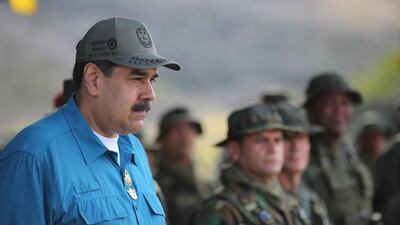Venezuela's President Nicolas Maduro flatly rejected on Sunday a call by European countries to call snap elections after opposition leader Juan Guaido declared himself the Latin American country's interim leader.
Mr Maduro said in an interview with Spanish television station Sexta that he would not "cave in to pressure" from those calling for his departure.
"They are trying to corner us with ultimatums to force us into an extreme situation of confrontation," Mr Maduro said.
Seven EU states had given Mr Maduro a Sunday deadline to call snap presidential elections or see them recognise Mr Guaido as interim president.
Mr Guaido, already recognised by the United States, Canada, Australia and several Latin American countries, said on Sunday he would lobby the European Union for badly-needed humanitarian aid to a nation wracked by economic crisis.
"We are going to exercise our powers to deal with the crisis, restore democracy and achieve freedom," the 35-year-old National Assembly leader said on Twitter.
Mr Guaido was also expected to announce a date for the arrival of humanitarian aid from the US -- a path President Maduro believes will lead to a US-led military intervention.
Mr Guaido says up to 300,000 people are "at risk of death" in Venezuela for want of humanitarian aid.
In Washington, US President Donald Trump warned that military intervention remains "an option" for dealing with the crisis in oil-rich but impoverished Venezuela.
Canadian Prime Minister Justin Trudeau meanwhile spoke to Mr Guaido by phone on Sunday, commending him for his "courage and leadership" and underscoring his call for new elections.
Earlier on Sunday, Mr Maduro addressed troops on military exercises in Venezuela's coastal northeast, calling on them for "maximum cohesion" a day after a top Air Force general publicly sided with Mr Guaido.
The opposition "wants to deliver the country in pieces to the gringo empire and the local oligarchies," Mr Maduro said.
The US recognised Mr Guaido as Venezuela's interim president on January 23 while seven European nations, including Britain, France, Germany and Spain, have said they will do likewise unless Mr Maduro calls presidential elections.
Austria was the latest to join the group. Foreign Minister Sebastian Kurz announced the decision to back the ultimatum in a tweet on Sunday.
France warned Mr Maduro of the approaching deadline and that it was preparing to recognise Mr Guaido.
"If between now and this evening Mr Maduro does not commit to organising presidential elections, we will consider that Mr Guaido is legitimate to organize them in his place," France's European Affairs Minister Nathalie Loiseau said on Sunday.
Tens of thousands of people turned out on Saturday for competing shows of support for Mr Guaido, who stunned the world 11 days ago by declaring himself "acting president", and for Mr Maduro who was sworn in on January 10 to a disputed second six-year term.
During the protest, Mr Guaido announced the installation of collection centres for medicine and food - items lacking in Venezuela - in neighbouring Colombia and Brazil.
Speaking at a pro-regime demonstration marking 20 years since his predecessor Hugo Chavez came to power, Mr Maduro ignored international demands for a new ballot and instead reiterated his call to bring forward legislative elections slated for the end of next year to this year.
"They want to bring forward elections, let's have elections," he said.
Mr Maduro, making his first appearance at a rally since a military parade in August when he claimed to have been targeted in an attempted assassination, accused Mr Guaido of being a US "puppet" in a coup attempt.
Under Mr Maduro's stewardship, oil-dependent Venezuela has lurched into an economic crisis that has left the country with hyperinflation and shortages of food and medicine.
But he refuses to allow aid into the country. At his rally on Saturday, he called the opposition "imperialist beggars", claiming a US pledge to deliver $20 million (Dh73m) in aid would precede military intervention.
Mr Guaido also called for a new demonstration on February 12, and another protest to push for the entry of aid.
Speaking at the European Union's headquarters in the east of the capital, he said this month "should be decisive".
All eyes are on the military, which has so far been Mr Maduro's main pillar of support, but there have been signs of unrest in the ranks.
European and Latin American states have formed a "Contact Group" giving themselves 90 days to resolve the crisis. They will meet in the Uruguayan capital Montevideo next Thursday, the EU said.
Meanwhile, the 14-nation Lima Group - made up of Canada and Latin American countries - meets in Ottawa on Monday. Eleven of its members have recognised Mr Guaido.
Mr Guaido moved to expand his international support by reassuring China - Venezuela's main creditor and a long-time ally of the socialist regime - that he would honour bilateral agreements if successful in ousting Mr Maduro.
Another key ally, Russia, hit out on Sunday against "destructive outside interference" in Venezuela's problems.

